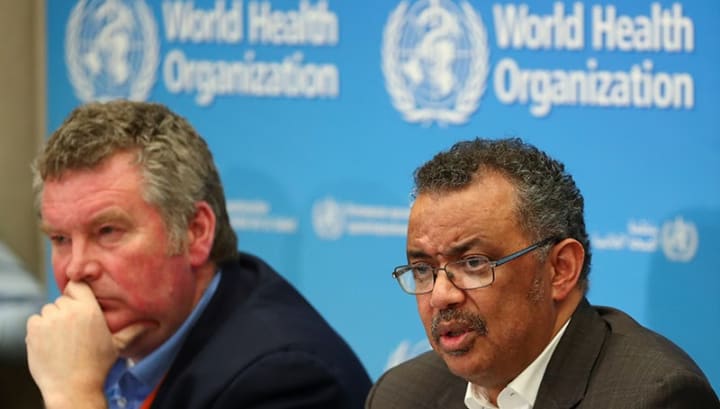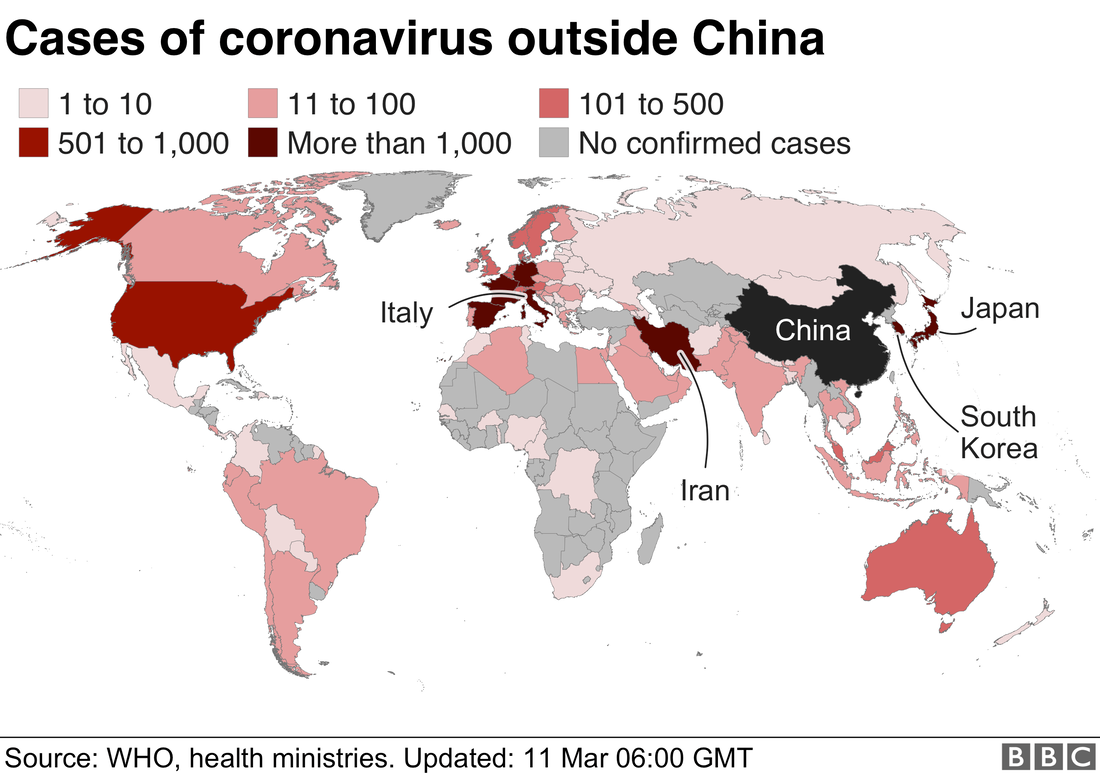A pandemic is defined as the "worldwide spread" of a new disease. Whereas, an outbreak is the occurrence of disease cases in excess of what's normally expected and an epidemic is more than a normal number cases of an illness, specific health-related behavior or other health-related events in a community or region, according to the World Health Organization.
There are currently 118,000 cases, more than 4,000 deaths, the agency said, and the virus has found a foothold on every continent except for Antarctica. Chancellor Angela Merkel foresees two-thirds of Germans being infected. The U.S., with more than 1,000 cases and business disruptions, weighs possible responses. The spread of the coronavirus across more than 100 countries now qualifies as a global pandemic.
"We have never before seen a pandemic sparked by a coronavirus. And we have never before seen a pandemic that can be controlled at the same time," WHO Director-General Tedros Adhanom Ghebreyesus said Wednesday - 11 March 2020.
Until now, the W.H.O. had avoided using the term to describe the epidemic leapfrogging across the world, for fear of giving the impression that it was unstoppable and countries would give up on trying to contain it. The organization had said earlier in the outbreak that it no longer officially declared when an epidemic reaches pandemic proportions, preferring instead to declare global public health emergencies.
There are currently 118,000 cases, more than 4,000 deaths, the agency said, and the virus has found a foothold on every continent except for Antarctica. Chancellor Angela Merkel foresees two-thirds of Germans being infected. The U.S., with more than 1,000 cases and business disruptions, weighs possible responses. The spread of the coronavirus across more than 100 countries now qualifies as a global pandemic.
"We have never before seen a pandemic sparked by a coronavirus. And we have never before seen a pandemic that can be controlled at the same time," WHO Director-General Tedros Adhanom Ghebreyesus said Wednesday - 11 March 2020.
Until now, the W.H.O. had avoided using the term to describe the epidemic leapfrogging across the world, for fear of giving the impression that it was unstoppable and countries would give up on trying to contain it. The organization had said earlier in the outbreak that it no longer officially declared when an epidemic reaches pandemic proportions, preferring instead to declare global public health emergencies.
"Describing the situation as a pandemic does not change WHO's assessment of the threat posed by this coronavirus. It doesn't change what WHO is doing, and it doesn't change what countries should do."
If countries detect, test, treat, isolate, trace and mobilize their people in the response, those with a handful of novel coronavirus cases can prevent those cases becoming clusters, and those clusters becoming community transmission. Several countries have demonstrated that this virus can be suppressed and controlled.
"WHO has been assessing this outbreak around the clock and we are deeply concerned both by the alarming levels of spread and severity, and by the alarming levels of inaction," Ghebreyesus said. "We cannot say this loudly enough, or clearly enough, or often enough: All countries can still change the course of this pandemic".
Although we are far more prepared than in the past, we are also far more interconnected, and many more people today have chronic health problems that make viral infections particularly dangerous.
The last pandemic reported in the world was the H1N1 flu pandemic in 2009, which killed hundreds of thousands globally. - CNN news article on 11 March 2020
If countries detect, test, treat, isolate, trace and mobilize their people in the response, those with a handful of novel coronavirus cases can prevent those cases becoming clusters, and those clusters becoming community transmission. Several countries have demonstrated that this virus can be suppressed and controlled.
"WHO has been assessing this outbreak around the clock and we are deeply concerned both by the alarming levels of spread and severity, and by the alarming levels of inaction," Ghebreyesus said. "We cannot say this loudly enough, or clearly enough, or often enough: All countries can still change the course of this pandemic".
Although we are far more prepared than in the past, we are also far more interconnected, and many more people today have chronic health problems that make viral infections particularly dangerous.
The last pandemic reported in the world was the H1N1 flu pandemic in 2009, which killed hundreds of thousands globally. - CNN news article on 11 March 2020



 RSS Feed
RSS Feed
